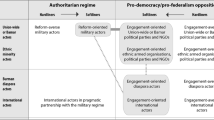Abstract
Richard Rose took a long view of regime evolution. He understood the development and replacement of regimes as a process of continuous interaction between rulers and ruled. In his model, the populace holds demands and expectations of government. Citizens compare the current regime with the past regime and an anticipated future regime, as well as potential alternative regime types. People have expectations about how they are likely to fare in the future based on their experience with the old regime and the regime currently in place, and their levels of support are continuously shaped by their personal experiences with it. Since even an authoritarian government requires some level of acceptance on the part of the populace, those attitudes and expectations affect the quality of the government the rulers provide. In his work on the transformation of the post-communist countries, Rose builds on the classic political culture research program initiated by Gabriel Almond and Sidney Verba, the World Values Study launched by Ronald Inglehart, and the later literature on regime transitions. He builds on Samuel Huntington’s model of waves of democratization followed by reversions to autocracy, as well as Robert Dahl’s conception of the dimensions of evolution of democracy, participation, and contestation (Huntington 1991; Dahl 1971).
Access this chapter
Tax calculation will be finalised at checkout
Purchases are for personal use only
Similar content being viewed by others
Notes
- 1.
The countries were Belarus, Bulgaria, the Czech Republic, Croatia, Hungary, Slovakia, Slovenia, Poland, Romania, Ukraine, and the Federal Republic of Yugoslavia (https://office.eurasiabarometer.org/projects/new-democracies-barometer).
- 2.
References
Adamecz-Völgyi, A., and Á. Szabó-Morvai. 2021. Confidence in Public Institutions Is Critical in Containing the COVID-19 Pandemic. Global Labor Organization Discussion Paper Series 861.
Almond, G.A., S.C. Flanagan, and R.J. Mundt, eds. 1973. Crisis, Choice and Change: Historical Studies of Political Development. Boston: Little Brown.
Bellin, E. 2000. Contingent Democrats: Industrialists, Labor, and Democratization in Late-Developing Countries. World Politics 52 (1): 175–205.
Blumenberg-Lampe, C. 1973. Das wirtschaftliche Programm der ‘Freiburger Kreise’: Entwurf einer freiheit-sozialen Nachkriegswirtschaft Nationalökonom gegen den Nationalsozialismus. Berlin: Duncker and Humblot.
Bollyky, T.J., et al. 2022. Pandemic Preparedness and COVID-19: An Exploratory Analysis of Infection and Fatality Rates, and Contextual Factors Associated with Preparedness in 177 countries, from Jan 1, 2020, to Sept 30, 2021,’ Lancet, February 1. https://www.thelancet.com/journals/lancet/article/PIIS0140-6736(22)00172-6/fulltext
Clancy, L. 2022. Hungarians Differ in Their Evaluations of Democracy Under Orban’s Leadership. Pew Research, August 3. https://www.pewresearch.org/fact-tank/2022/08/03/hungarians-differ-in-their-evaluations-of-democracy-under-orbans-leadership
Dahl, R.A. 1956. A Preface to Democratic Theory. Chicago: University of Chicago Press.
———. 1971. Polyarchy: Participation and Opposition. New Haven, CT: Yale University Press.
———. 1982. Dilemmas of Pluralist Democracy: Autonomy vs. Control. New Haven, CT: Yale University Press.
Dyson, K. 2021. Conservative Liberalism, Liberalism, Ordo-Liberalism, and the State. New York: Oxford University Press.
Föste, W. 2006. Grundwerte in der Ordnungskonzeption der Sozialen Marktwirtschaft. Marburg: Metropolis.
Frye, T.J. 2002. The Perils of Polarization: Economic Performance in the Postcommunist World. World Politics 54 (3): 308–337.
Hacker, J., and P. Pierson. 2020. Let Them Eat Tweets. New York: Liveright/Norton.
Hellman, J. 1998. Winners Take All: The Politics of Partial Reform in Postcommunist Transitions. World Politics 50 (1): 203–234.
Howard, M.M. 2003. The Weakness of Civil Society in Post-Communist Europe. New York: Cambridge University Press.
Huntington, S.P. 1991. The Third Wave: Democratization in the Late Twentieth Century. Norman, OK: University of Oklahoma Press.
Kolev, S. 2017. Neoliberale Staatsverständnisse im Vergleich. Berlin: Walter de Gruyter.
Lipset, S.M. 1959. Some Social Requisites of Democracy: Economic Development and Political Legitimacy. American Political Science Review 53 (1): 69–105.
Migranyan, A. 2015. Peculiarities of Russian Politics. In Democracy in a Russian Mirror, ed. A. Przeworski. New York: Cambridge University Press.
Mishler, W., and R. Rose. 2001. What Are the Origins of Political Trust? Testing Institutional and Cultural Theories in Post-Communist Societies. Comparative Political Studies 34 (1): 30–62.
———. 2002. Learning and Re-learning Regime Support: The Dynamics of Post-Communist Regimes. European Journal of Political Research 41 (1): 5–36.
———. 2007. Generation, Age, and Time: The Dynamics of Political Learning during Russia’s Transformation. American Journal of Political Science 51 (4): 822–834.
Moore, B. 1966. Social Origins of Dictatorship and Democracy: Lord and Peasant in the Making of the Modern World. Boston: Beacon Press.
Müller, Jan-Werner. 2021. Democracy Rules. New York: Farrar, Straus and Giroux.
O’Donnell, G., and P.C. Schmitter, eds. 1986. Transitions from Authoritarian Rule: Comparative Perspectives. Baltimore, MD: Johns Hopkins University Press.
Rose, R. 2009. Understanding Post-Communist Transformation: A Bottom Up Approach London. New York: Routledge.
Rose, R., W. Mishler, and C. Haerpfer. 1998. Democracy and Its Alternatives: Understanding Post-Communist Societies. Baltimore, MD: Johns Hopkins University Press.
Rose, R., W. Mishler, and N. Munro. 2011. Popular Support for an Undemocratic Regime: The Changing View of Russians. Cambridge: Cambridge University Press.
Rose, R., and D.C. Shin. 2001. Democratization Backwards: The Problem of Third-Wave Democracies. British Journal of Political Science 31 (4): 331–354.
Rosenfeld, B. 2020. The Autocratic Middle Class: How State Dependency Reduces the Demand for Democracy. Princeton: Princeton University Press.
Tilly, C., ed. 1975. The Formation of National States in Western Europe. Princeton: Princeton University Press.
Author information
Authors and Affiliations
Corresponding author
Editor information
Editors and Affiliations
Rights and permissions
Copyright information
© 2023 The Author(s), under exclusive license to Springer Nature Switzerland AG
About this chapter
Cite this chapter
Remington, T.F. (2023). Democracy and Its Alternatives. In: Keating, M., McAllister , I., Page, E.C., Peters, B.G. (eds) The Problem of Governing . Executive Politics and Governance. Palgrave Macmillan, Cham. https://doi.org/10.1007/978-3-031-40817-5_12
Download citation
DOI: https://doi.org/10.1007/978-3-031-40817-5_12
Published:
Publisher Name: Palgrave Macmillan, Cham
Print ISBN: 978-3-031-40816-8
Online ISBN: 978-3-031-40817-5
eBook Packages: Political Science and International StudiesPolitical Science and International Studies (R0)



